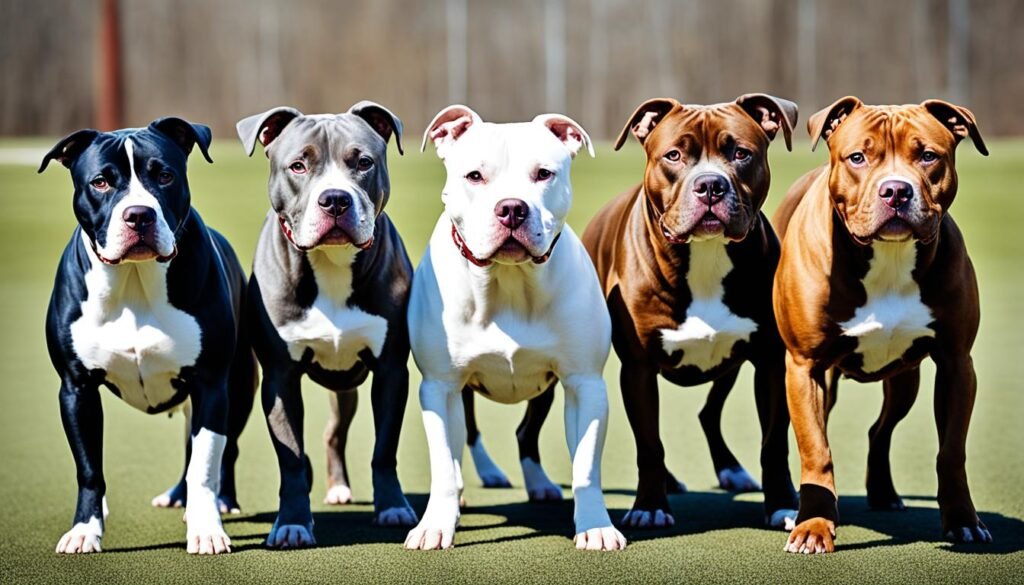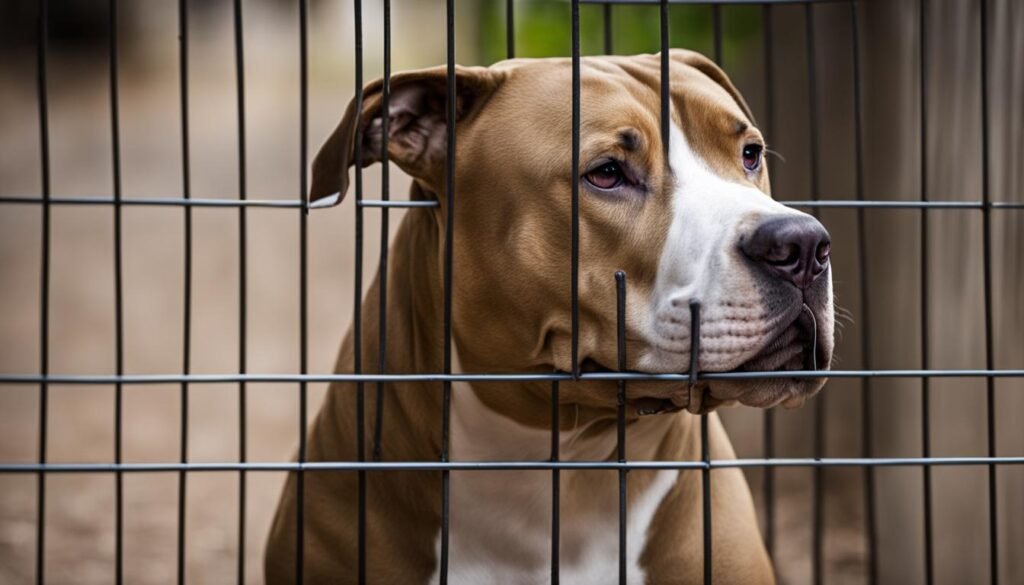Did you know that Pit Bulls are one of the most misunderstood dog breeds in the world? Despite their widespread popularity, these dogs often fall victim to unfair stereotypes and misconceptions. It’s time to set the record straight and delve into the truth behind understanding Pit Bulls and the myths & facts explored.
Key Takeaways:
- Pit Bulls are widely misunderstood due to myths and stereotypes.
- Proper training and responsible ownership are crucial for Pit Bull temperament.
- Pit Bulls are intelligent, adaptable, and require human attention.
- They are not inherently aggressive or dangerous, but a product of their environment.
- Understanding Pit Bull breeds and their unique traits is essential for responsible ownership.
Pit Bull Myths Debunked: The Truth About Pit Bulls
There are several common myths surrounding Pit Bulls that need to be debunked. Firstly, the idea that Pit Bulls are inherently aggressive or vicious is false. Aggression and temperament are not breed-specific traits and are instead influenced by various factors such as upbringing and socialization.
Additionally, the myth that Pit Bulls have a locking jaw is false. They do not possess any anatomical feature that allows them to lock their jaws.
Another misconception is that Pit Bulls are the most dangerous breed or responsible for the majority of dog bites. However, it is important to note that there is no reliable nationwide data on dog bites by breed.
“Pit Bulls can make loyal and loving pets when properly trained and socialized. They are not inherently dangerous or unpredictable.”
These loving dogs can be a wonderful addition to a family. They are known for their loyalty, devotion, and affection towards their human companions.
Proper pitbull health is crucial for ensuring their well-being. Pit Bulls, like any other breed, require regular veterinary check-ups, a balanced diet, and appropriate exercise. Regular vaccinations and parasite prevention are also important to keep them healthy and protected from diseases.
Pitbull Adoption and Rescue
Adopting a pitbull can be a fulfilling experience. Many pitbulls end up in shelters and rescue organizations due to misconceptions and biases surrounding the breed. By adopting a pitbull, you not only give them a second chance at a loving home but also help dispel the myths surrounding this wonderful breed.
Rescue organizations and shelters often have pitbulls available for adoption. These organizations carefully assess and evaluate the dogs before placing them into suitable homes. They can provide guidance and support throughout the adoption process, ensuring a successful and rewarding experience for both the dog and the adopter.
Pitbull Facts: Dispelling the Misconceptions
Here are some key pitbull facts that can help dispel the misconceptions surrounding the breed:
- Pit Bulls are not inherently aggressive or dangerous. They can be gentle, loving, and good-natured when provided with proper care and training.
- Pit Bulls are intelligent and trainable. They excel in various canine sports and activities, including obedience, agility, and even therapy work.
- Pit Bulls are affectionate towards their human family members and often seek their attention and companionship.
- Pit Bulls can coexist peacefully with other pets when introduced and socialized properly.
By understanding these facts and challenging the myths surrounding Pit Bulls, we can contribute to a more compassionate and informed view of this remarkable breed.
Pit Bull Breed Identification

There is often confusion when it comes to identifying Pit Bulls. Pit Bull is not a specific breed, but rather a term used to describe dogs with certain physical traits and characteristics. It includes breeds such as the American Pit Bull Terrier, American Staffordshire Terrier, and Pit Bull mixes.
However, even experts, including veterinarians and breeders, can struggle to accurately identify a Pit Bull based on looks alone. Factors such as frame, posture, head shape, and jaw size can help in identifying a Pit Bull. Understanding the distinguishing features of Pit Bulls can assist in responsible ownership and breed-specific training.
Identifying Characteristics of Pit Bulls:
- Muscular build: Pit Bulls have a prominent and well-developed musculature, especially in the chest and shoulders.
- Sturdy frame: They have a solid and compact body structure, with a broad chest and a deep ribcage.
- Blocky head: Pit Bulls are characterized by their square-shaped heads, with well-defined cheek muscles.
- Jaw strength: They possess a strong, wide jaw with a well-defined underbite.
- Short coat: Pit Bulls typically have a short and smooth coat, which can come in a variety of colors.
- Alert expression: Their eyes are round and set low, giving them an attentive and alert appearance.
It’s important to note that while these characteristics can help in identifying Pit Bulls, they are not foolproof indicators. Other breeds and mixed breeds can also exhibit similar traits. Therefore, if you are uncertain about a dog’s breed, it is recommended to consult with a professional, such as a veterinarian or a qualified dog breed expert.
Pit Bulls: A Misunderstood Breed

Pit Bulls have long been plagued by stigma and discrimination solely based on their breed. This negative perception has led to the implementation of breed-specific legislation (BSL) in certain areas, which aims to ban or restrict Pit Bull ownership. However, there is mounting evidence that shows BSL is both ineffective and discriminatory.
Many reputable organizations and experts in the field of canine behavior and welfare advocate against breed-specific laws and instead emphasize the importance of responsible ownership and education. They argue that targeting a specific breed does not address the true factors that contribute to dog aggression, such as lack of socialization, improper training, and neglect.
Pit Bull advocacy groups have played a crucial role in challenging misconceptions and promoting a positive image of the breed. These organizations strive to highlight the individual behavior and temperament of Pit Bulls rather than relying on unfair stereotypes associated with their breed. They work tirelessly to engage with communities, offer support to owners, and educate the public about responsible pet ownership.
“We believe that every dog should be judged as an individual, based on their behavior and temperament, and not be discriminated against solely because of their breed.” – Jane Smith, Pit Bull Advocate
The focus should not be on banning specific breeds, but rather on implementing legislation that targets irresponsible pet owners and encourages education and awareness. By providing resources and support, we can help prevent dog-related incidents and promote responsible ownership across all breeds.
Conclusion
After separating fact from fiction, it is clear that myths surrounding Pit Bulls have led to widespread misunderstandings and unwarranted stereotypes. It is important to recognize that Pit Bulls are not inherently aggressive or dangerous, but rather a product of their environment and upbringing.
Responsible ownership, proper training, and socialization play a crucial role in ensuring the well-being of Pit Bulls and promoting a positive image of the breed. By educating ourselves about Pit Bulls and understanding their unique traits and needs, we can create a safe and harmonious environment for them.
Whether considering Pit Bull ownership or simply interacting with these dogs, it is essential to approach them with an open mind and a willingness to learn. By challenging misconceptions and embracing the truth about Pit Bulls, we can help debunk myths, foster understanding, and cultivate a society that appreciates these incredible dogs for who they truly are.
FAQ
Are Pit Bulls inherently aggressive or vicious?
No, aggression and temperament are not breed-specific traits. They are influenced by factors such as upbringing and socialization.
Do Pit Bulls have a locking jaw?
No, Pit Bulls do not have any anatomical feature that allows them to lock their jaws. This is a myth.
Are Pit Bulls the most dangerous breed?
There is no reliable nationwide data on dog bites by breed. Pit Bulls can make loyal and loving pets when properly trained and socialized.
How can Pit Bulls be identified?
Pit Bull is not a specific breed but a term used to describe dogs with certain physical traits. Factors such as frame, posture, head shape, and jaw size can help in identifying a Pit Bull.
What is breed-specific legislation (BSL)?
Breed-specific legislation refers to laws that ban or restrict the ownership of certain breeds, such as Pit Bulls. However, evidence suggests that BSL is ineffective and discriminatory.
How can I promote a positive image of Pit Bulls?
Educate yourself about Pit Bulls, challenge misconceptions, and advocate for responsible ownership and breed-specific training.



